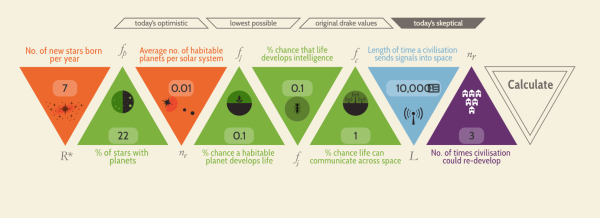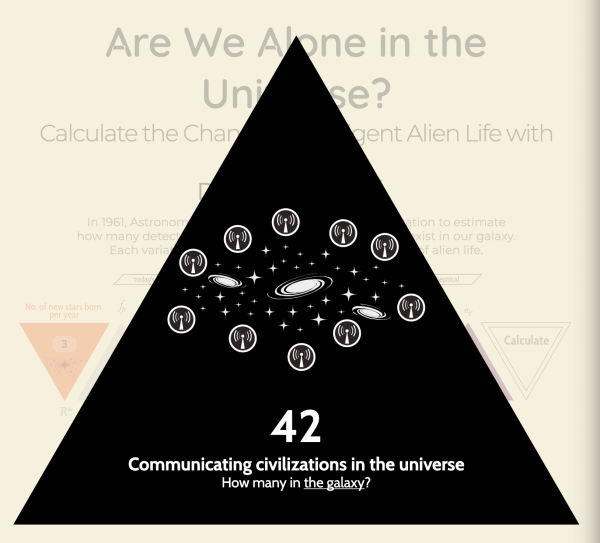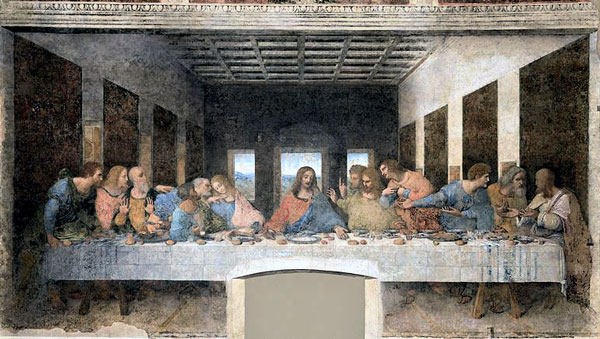Last week, Astronomers announced the discovery of the most promising "hints" of life on an exoplanet, K2-18, 124 light years away.
While it would only be signs of phytoplankton and other microscopic marine life, it would still be a massive finding.
I tend to read a lot across a wide variety of sources. Recently, I've noticed a significant uptick in stories about aliens, UFOs, non-human intelligence, and non-human technology. In addition, several of my seemingly sane friends claim to have direct knowledge of projects and groups (funded by well-known billionaires) close to making very public announcements about missions, research, and discoveries in these areas, they hope will result in discontiguous innovations and asymmetric capabilities.

While I believe it's naive to assume that there's no other form of life in a universe as vast as what we understand ... I'm also highly skeptical of anyone who claims that they have specific knowledge or proof. With that said, I have seen enough stuff from people I trust to expect that our beliefs about these issues will shift massively in the very near future. As an example, check out Skywatch.ai, some of its videos, or this NewsNation broadcast.
Since we live in a time where technologies are rapidly advancing, I thought it might be interesting to test out an AI-powered chatbot designed to debunk conspiracy theories through evidence-based conversations. It is a spin-out project with roots at MIT and other top universities. Research shows that many people doubted or abandoned false beliefs after a short conversation with the DebunkBot.
I first heard of this tool through these two articles: Meet DebunkBot, The AI Chatbot that Will Debunk Any Conspiracies You Believe and AI Chatbot Shows Promise in Talking People Out of Conspiracy Theories.
Here is a link to the conversation I had with it about the belief "Life likely exists elsewhere in the Universe due to its vastness and the repeated conditions that can give rise to life." To my surprise, this tool concluded that the belief is not a conspiracy theory and reminded me that:
Science for the sake of knowing is one thing. Belief for the sake of hope, curiosity, or imagination is another. The search for "life" might actually help us discover something more valuable than what we thought we were searching for in the first place.
You can test your beliefs against DebunkBot's AI. Let me know how it goes and whether you changed your mind.
Meanwhile, Information Is Beautiful has an interactive data visualization to help you decide if we're alone in the Universe.
As usual, it's well done, fun, and informative.
For the slightly geeky amongst us, the model lets you adjust the estimate by playing with the Drake and Seager equations.
The Drake equation estimates the number of detectable extraterrestrial civilizations in our galaxy and the universe. It factors in variables such as habitable planets, the likelihood of life, intelligent life, and the duration of time a civilization sends signals into space.
The Seager equation is a modern take on the equation, focusing on bio-signatures of life that we can currently detect - for example, the number of observable stars/planets, the % have life, and the % chance of detectable bio-signature gas.
Click here to play with the Are We Alone in the Universe infographic.
 via Information Is Beautiful
via Information Is Beautiful
For both equations, the infographic lets you look at various default options, but also enables you to change the variables based on your beliefs.
For example, the skeptic's default answer for Drake's equation shows 0.0000062 communicating civilizations in our galaxy, which is still 924,000 in the universe. The equivalent for Seager's equation shows 0.0009000 planets with detectable life in our "galactic neighborhood" and 135,000,000 planets in our universe.
Even with the "lowest possible" selection chosen, Drake's equation still shows 42 communicating civilizations (Douglas Adams, anyone?) in the universe.
 via Information Is Beautiful
via Information Is Beautiful
One of the most interesting numbers (and potentially influential numbers for me) is the length of time a civilization sends signals into space. Conservative estimates are 420 years, but optimistic estimates are 10,000 or more.
One other thing to consider is that some scientists believe that life is most likely to grow on planets with very high gravity, which would also make escaping their atmosphere for space travel nigh impossible.
If any aliens are reading this ... don't worry, I won't tell. But we will find out who you voted for in the last election.



Are We Alone In The Universe?
Last week, Astronomers announced the discovery of the most promising "hints" of life on an exoplanet, K2-18, 124 light years away.
While it would only be signs of phytoplankton and other microscopic marine life, it would still be a massive finding.
I tend to read a lot across a wide variety of sources. Recently, I've noticed a significant uptick in stories about aliens, UFOs, non-human intelligence, and non-human technology. In addition, several of my seemingly sane friends claim to have direct knowledge of projects and groups (funded by well-known billionaires) close to making very public announcements about missions, research, and discoveries in these areas, they hope will result in discontiguous innovations and asymmetric capabilities.
While I believe it's naive to assume that there's no other form of life in a universe as vast as what we understand ... I'm also highly skeptical of anyone who claims that they have specific knowledge or proof. With that said, I have seen enough stuff from people I trust to expect that our beliefs about these issues will shift massively in the very near future. As an example, check out Skywatch.ai, some of its videos, or this NewsNation broadcast.
Since we live in a time where technologies are rapidly advancing, I thought it might be interesting to test out an AI-powered chatbot designed to debunk conspiracy theories through evidence-based conversations. It is a spin-out project with roots at MIT and other top universities. Research shows that many people doubted or abandoned false beliefs after a short conversation with the DebunkBot.
I first heard of this tool through these two articles: Meet DebunkBot, The AI Chatbot that Will Debunk Any Conspiracies You Believe and AI Chatbot Shows Promise in Talking People Out of Conspiracy Theories.
Here is a link to the conversation I had with it about the belief "Life likely exists elsewhere in the Universe due to its vastness and the repeated conditions that can give rise to life." To my surprise, this tool concluded that the belief is not a conspiracy theory and reminded me that:
You can test your beliefs against DebunkBot's AI. Let me know how it goes and whether you changed your mind.
Meanwhile, Information Is Beautiful has an interactive data visualization to help you decide if we're alone in the Universe.
As usual, it's well done, fun, and informative.
For the slightly geeky amongst us, the model lets you adjust the estimate by playing with the Drake and Seager equations.
The Drake equation estimates the number of detectable extraterrestrial civilizations in our galaxy and the universe. It factors in variables such as habitable planets, the likelihood of life, intelligent life, and the duration of time a civilization sends signals into space.
The Seager equation is a modern take on the equation, focusing on bio-signatures of life that we can currently detect - for example, the number of observable stars/planets, the % have life, and the % chance of detectable bio-signature gas.
Click here to play with the Are We Alone in the Universe infographic.
For both equations, the infographic lets you look at various default options, but also enables you to change the variables based on your beliefs.
For example, the skeptic's default answer for Drake's equation shows 0.0000062 communicating civilizations in our galaxy, which is still 924,000 in the universe. The equivalent for Seager's equation shows 0.0009000 planets with detectable life in our "galactic neighborhood" and 135,000,000 planets in our universe.
Even with the "lowest possible" selection chosen, Drake's equation still shows 42 communicating civilizations (Douglas Adams, anyone?) in the universe.
One of the most interesting numbers (and potentially influential numbers for me) is the length of time a civilization sends signals into space. Conservative estimates are 420 years, but optimistic estimates are 10,000 or more.
One other thing to consider is that some scientists believe that life is most likely to grow on planets with very high gravity, which would also make escaping their atmosphere for space travel nigh impossible.
If any aliens are reading this ... don't worry, I won't tell. But we will find out who you voted for in the last election.
Posted at 06:14 PM in Business, Current Affairs, Food and Drink, Gadgets, Ideas, Just for Fun, Market Commentary, Personal Development, Religion, Science, Trading, Web/Tech | Permalink | Comments (0)
Reblog (0)